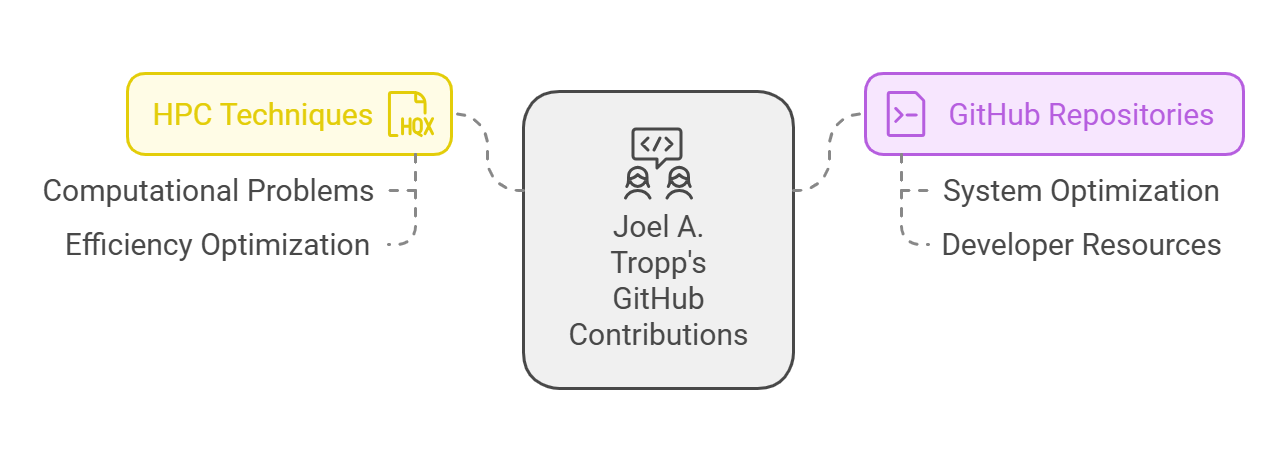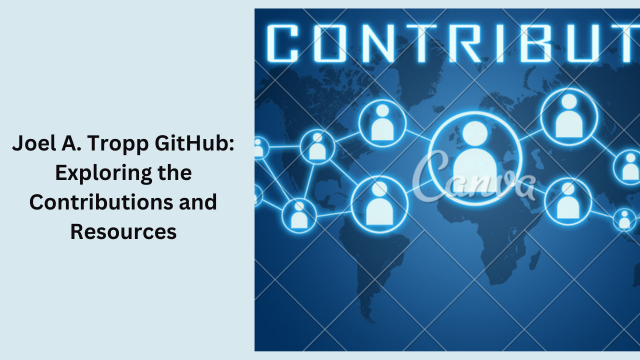Joel A. Tropp GitHub: 5 Amazing Contributions and Resources You Need to Explore”
Introduction
Joel A. Tropp is a renowned name in the fields of applied mathematics, computational science, and data analysis. Computational science, and data analysis. Tropp is a professor of applied and computational mathematics at the California Institute of Technology, Caltech. He is known for his work in sparse approximation, matrix theory, and randomized numerical linear algebra. His work is referred to by many students, researchers, and professionals as the foundation for understanding complex algorithms and mathematical models. One of the places where his work can be accessed is through GitHub, which is a popular website for sharing and collaborating on open-source code.
This paper discusses Joel A. Tropp’s contributions on GitHub, the importance of his work, and how researchers and developers can benefit from it.Joel A. Tropp GitHubJoel A. Tropp GitHubJoel A. Tropp GitHub
About Joel A. Tropp
It is important to give some background information on Joel A. Tropp’s academic and professional experience before his contributions on GitHub are discussed. A professor and researcher, Tropp has authored numerous papers discussing quite critical challenges in modern numerical computing, machine learning, and signal processing. Research often represents a good combination of theory and application; thus, it is rather helpful to a wide range of audiences.
Some of the main areas of his expertise are:
Sparse Representations: Developing algorithms that exploit sparsity in signals to compress and recover the same data.
Randomized Numerical Linear Algebra: Easy approximation of complex matrix computations using randomized methods.High-Dimensional Data Analysis: Overcoming massive-data challenges in analyzing these kinds of data using mathematics principles.
Joel A. Tropp’s GitHub: Your Resource Hub for Researchers
The GitHub platform serves as the forum where developers, researchers, and scholars can share code, work together on projects, and gain from other people. In essence, the presence of Joel A. Tropp in GitHub signifies his commitment to furthering the cause of computational mathematics as he is ready to implement his research work in practice, thus producing well-documented implementations.
Joel A. Tropp’s GitHub repositories mostly contain:1. Open-source implementations of algorithms
His work often brings novel algorithms to tackle computational problems: sparse recovery, for instance, and randomized matrix decomposition. These algorithms play an essential role in the application domains of signal processing, statistics, and machine learning. Open-source implementations on GitHub enable researchers to test and apply his methods to actual problems.Joel A. Tropp GitHubJoel A. Tropp GitHubJoel A. Tropp GitHubJoel A. Tropp GitHubJoel A. Tropp GitHub
2. Reproducible Research
One of the characteristics of modern scientific work is reproducibility. Many of the GitHub repositories maintained by Tropp contain clear documentation and examples that make it easier for users to replicate his results. Such an approach builds trust in research and accelerates progress.
3. Educational Resources
Also available on GitHub is Joel A. Tropp’s, that is a great resource not just for students but also teachers. The repositories usually consist of implementations in code of the published papers, which therefore makes them a fantastic complimentary tool to theoretical study: the code provides handy illustrations of how mathematical results apply to computational problems.
4. Collaboration and Community Participation
GitHub is not only a place for sharing code but also a space for collaboration. The repositories of Tropp are open for contributions and discussions, so other researchers can collaborate, improve the code, and share their own insights.
5. Tools for High-Performance Computing
Many of Tropp’s works are implemented using HPC techniques to solve computationally intensive problems. There is code on GitHub that demonstrates how to efficiently implement these techniques, which can help developers optimize their systems.
Significance of Joel A. Tropp’s GitHub for Researchers and Developers
Joel Tropp’s GitHub is not just another collection of codes-it is a repository of high-value resources for someone involved in applied mathematics, machine learning, or numerical computing. Here are some reasons why Joel’s GitHub contributions stand apart in their own class.Applicable Implementations: There could be a gap between ideas and implementation, but Joel Tropp bridges it completely by providing ready-to-use algorithms.Educational Value: His codes also assist learners and teachers with more transparent views on intricate mathematical expressions due to experimentation.
Open Collaboration: Work conducted by the author at GitHub opens collaborative innovation avenues where Tropp’s ideas ignite more solution-solving capabilities into problems surrounding the topic.
Cutting-edge research: The algorithms and tools he shared are cutting-edge advancements in computational science.
For students, educators, and developers alike, Joel A. Tropp’s GitHub offers an amount of knowledge and practical tools to further one’s understanding of computational mathematics.

Conclusion
Joel A. Tropp’s GitHub page is a treasure trove of resources for researchers, educators, and developers working in the applied mathematics and computational science fields. His commitment to open-source software, reproducible research, and educational outreach makes his contributions both accessible and impactful. Whether you are a student exploring numerical computing, a researcher implementing cutting-edge algorithms, or a developer optimizing your systems, Joel A. Tropp’s GitHub offers tools and resources that can help you advance your work.
How to Fix Line Chart GitHub Doesn’t Work in Android Studio
FAQs About Joel A. Tropp and His GitHub
1. On Joel A. Tropp’s GitHub, what resources will I find?
Algorithms’ open-source implementations, code alongside his research papers, computational mathematics education, and the tools of high-performance computing.
2. How can I use the GitHub repositories of Joel A. Tropp?
Most of Joel A. Tropp’s repositories are open source, meaning that you may download and modify the code freely for an academic or personal project. You may also refer to the documentation for step-by-step guidance.
3. Are the Joel A. Tropp’s GitHub repositories beginner-friendly?
While the content may be challenging from a standpoint of mathematics and programming for some of his repositories, clear documentation generally makes him easier to work with than most.
4. What is the contribution of Joel A. Tropp’s research to numerical computing?
The sparse recovery algorithms proposed in his works, randomized matrix methods and other related developments significantly contribute towards solving modern computational and numerical problems efficiently.
5. How can I contribute or collaborate with Joel A. Tropp on GitHub?
I can assist him by forking his repositories, improving them, and sending pull requests. One may even join the discussions to help him improve his code.

